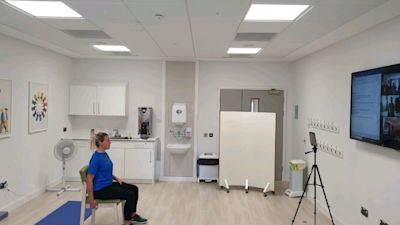Virtual rehab programme at RUH Bath hailed as excellent

A ground-breaking virtual rehabilitation scheme at the Royal United Hospitals Bath has been praised.
The Axial Spondyloarthritis (AxSpA) programme is usually carried out in person but in response to the challenges of Covid, outpatients can now access a virtual rehabilitation programme – one of the first of its kind in the country.
AxSpa is a painful and progressive form of inflammatory arthritis.
The hospital has been working with the departments for health and computer science at the University of Bath on the Project.
This new scheme uses a smartphone app to let people with AxSpA track their symptoms daily and gain a better understanding of their condition.
Rheumatology outpatients called the programme excellent and thanked the RUH and its dedicated staff.
One patient said: “The course was extremely informative. I have learned a lot and it has changed my outlook. All the staff were brilliant, friendly, welcoming and knowledgeable.”
Another said: “I didn’t start the course in a good place and my expectations were low.
'Hundreds are suffering'-woman leads campaign against problematic implants
Dad loses three limbs to sepsis after thinking he caught flu
“I was proved completely wrong – I’m now in a much better place and feel more positive and energised. I would recommend it.”
The positive feedback came ahead of World Axial Spondyloarthritis day on May 8, which aims to raise awareness of the condition.
Georgia Smyth, Team Leader for AxSpA, said: “Each day has a varied mix of sessions, including live educational talks, exercise and stretching sessions.
“There is input from physiotherapists, occupational therapists, specialist nurses, a podiatrist and a psychologist. This has been a real team effort and we’re delighted that the course has been so well received by patients and is having such a positive impact on their condition.”
Rosie Barnett, PhD Student and Researcher working on the project under the name Nightingale, said: “Project Nightingale is allowing us to capture subtle changes in disease experience, not currently considered in clinical practice.
“We hope that in future, this research will help optimise and personalise treatment for AxSpA, to improve quality of life for patients.
“Some of our participants have said that the app has helped them better understand their condition and encouraged them to implement lifestyle changes to improve their symptoms.
“We are excited about the future of this work and the impact it may have on the AxSpA community.”
Credit: Matthew McLaughlin, Local Democracy Reporter
Read more: